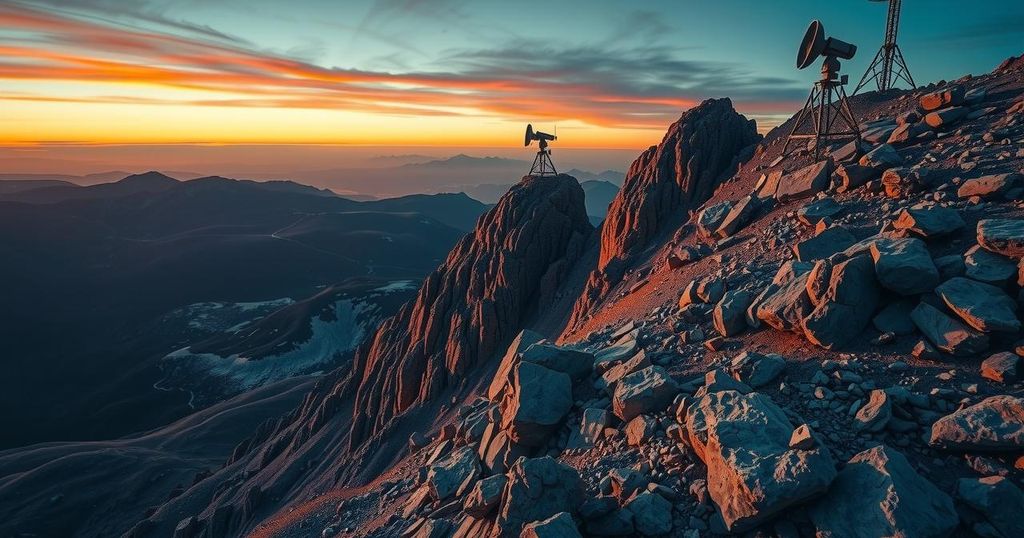World news
AF, AFRICA, ASIA, CAIRO, CHAD, CIVIL WAR, COMMITTEE TO PROTECT, COMMITTEE TO PROTECT JOURNALISTS, CONFLICT, DARFUR, EGYPT, EL - GENEINA, GAZA, GAZA STRIP, GEDAREF, HUMANITARIAN CRISIS, IBRAHIM, NOON, NORTH DARFUR, RAPID SUPPORT FORCES, REFUGEE CRISIS, REPORTERS WITHOUT BORDERS, RSF, SUDAN, TAWILA, UN, WAR, WEST DARFUR
Daniel O'Connor
0 Comments
Sudan’s Journalists Brave Risks to Report on War’s Horrors
Sudanese journalists are risking their lives to report on the atrocities of the ongoing war in Darfur, where communications have suffered greatly. Since the outbreak of violence in April 2023, many journalists have been killed, detained, or forced into hiding. Pseudonymous stories shared from within the conflict zones illustrate their determination to reveal harrowing truths while facing extreme danger and minimal support.
In a stark testament to their courage and resilience, Sudanese journalists navigate treacherous terrains in search of signals to share urgent stories about the ongoing war. Making their way to the mountain borders near Chad, these reporters work tirelessly, knowing that a two-year communication black hole has made it all but impossible to relay the truths of the humanitarian crisis unfolding in Darfur. Stories of violence, mass displacement, and sexual atrocities are precisely what they feel compelled to broadcast, and they view it as their duty to the world.
The conflict has claimed the lives of 28 journalists since violence erupted between the Sudanese army and the paramilitary Rapid Support Forces (RSF) in April 2023, with many more facing detention and torture. Power shortages and cuts to internet access further complicate their already perilous work conditions. One journalist, identified only as Noon for her safety, vividly recalls being targeted after reporting on ethnic massacres in El-Geneina, which led to accusations of genocide against the RSF. She fled to the eastern state of Gedaref, nearly 1,800 kilometers away, but safety proved elusive there as well.
Noon’s ordeal did not stop in Gedaref, where she found herself detained and accused of colluding with the RSF. She was coerced into signing a government pledge that required pre-approval for her stories. This environment of suppression and fear has driven around 400 journalists to flee the country, according to Reporters Without Borders. Despite this, a small number continue their work under constant surveillance and danger.
Ibrahim, a 30-year-old photojournalist from North Darfur, adopts a pseudonym to avoid repercussions for his reporting on humanitarian crises. His work is risky; detained by RSF fighters last year, he endured days of torture before being released. Now, relocated to the town of Tawila, he relies solely on his mobile phone to document the suffering and famine he witnesses. Ibrahim’s fear is palpable, as he states, “No one can know what I do; if they find out, they’ll arrest me or take my phone.”
The struggle of these journalists is daunting given that even before the war, Sudan ranked poorly on the Reporters Without Borders Press Freedom Index. The environment has only deteriorated, with many journalists now facing life-or-death situations. In the central state of Al-Jazira, veteran journalist Youssef has had to abandon traditional reporting; he now raises goats and grows sorghum to make ends meet. Youssef’s recollections of detainment by RSF fighters illuminate the danger lurking for journalists: “That is the biggest crime,” they told him after he revealed his profession to them.
Despite the lack of support from media organizations, both Youssef and Ibrahim remain determined to report the truth of the conflict. Ibrahim has created a makeshift newsroom in a Tawila coffee shop, relying on limited power from a solar panel, affirming with urgency, “Who else will tell the world what’s happening in Darfur if we leave? No one else will tell these stories. No one can imagine the atrocities happening here.”
The steadfastness of Sudanese journalists amid the ongoing war highlights their immense bravery as they document and share the horrifying realities of the conflict in Darfur. Despite facing imminent danger, detention, and a lack of support, individuals like Noon, Ibrahim, and Youssef continue to commit themselves to telling vital stories. Their work not only provides crucial information to the outside world but also stands as a testament to the resilience of the human spirit in the face of adversity.
Original Source: www.rfi.fr




Post Comment